Ethics and Sustainability: Ethical Business and CSR Analysis Report
VerifiedAdded on 2020/04/15
|7
|1876
|128
Report
AI Summary
This report delves into the critical intersection of ethics and sustainability within the business landscape. It begins by defining Corporate Social Responsibility (CSR) and exploring its theoretical underpinnings, including stakeholder theory, business ethics theory, and shareholder value theory. The report identifies key trends driving corporate ethics and sustainability, such as embedding sustainability, sustainable innovation, and transparency. It examines CSR from stakeholder perspectives at both national and international levels, highlighting the influence of foreign social norms on international business practices. Furthermore, the report differentiates between legal and ethical compliance of CSR, analyzing their impact on legislative frameworks. Finally, it explores the relationship between ethical branding and corporate reputation, emphasizing how ethical practices contribute to building a strong brand image and positive corporate reputation. The report draws upon various academic sources to support its analysis.
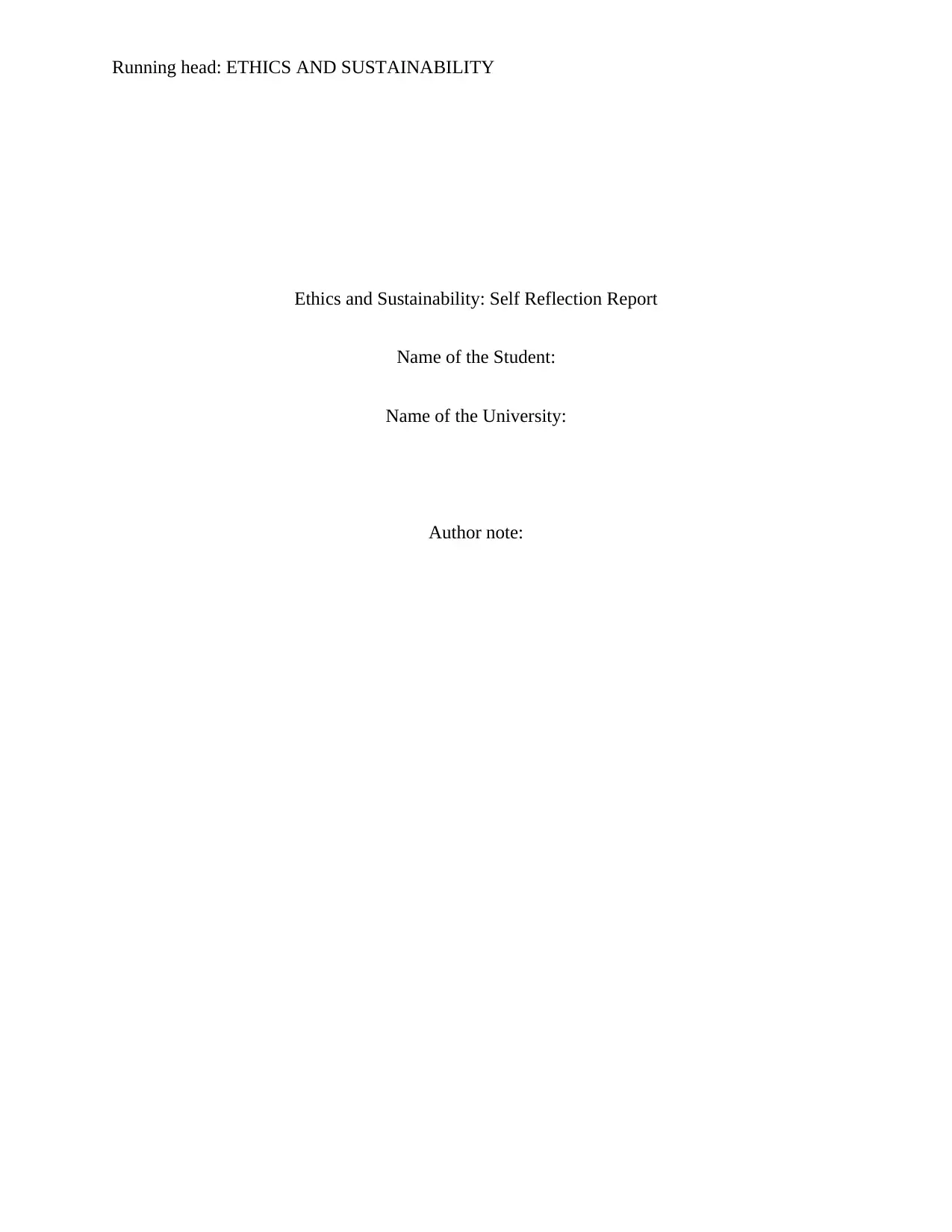
Running head: ETHICS AND SUSTAINABILITY
Ethics and Sustainability: Self Reflection Report
Name of the Student:
Name of the University:
Author note:
Ethics and Sustainability: Self Reflection Report
Name of the Student:
Name of the University:
Author note:
Paraphrase This Document
Need a fresh take? Get an instant paraphrase of this document with our AI Paraphraser
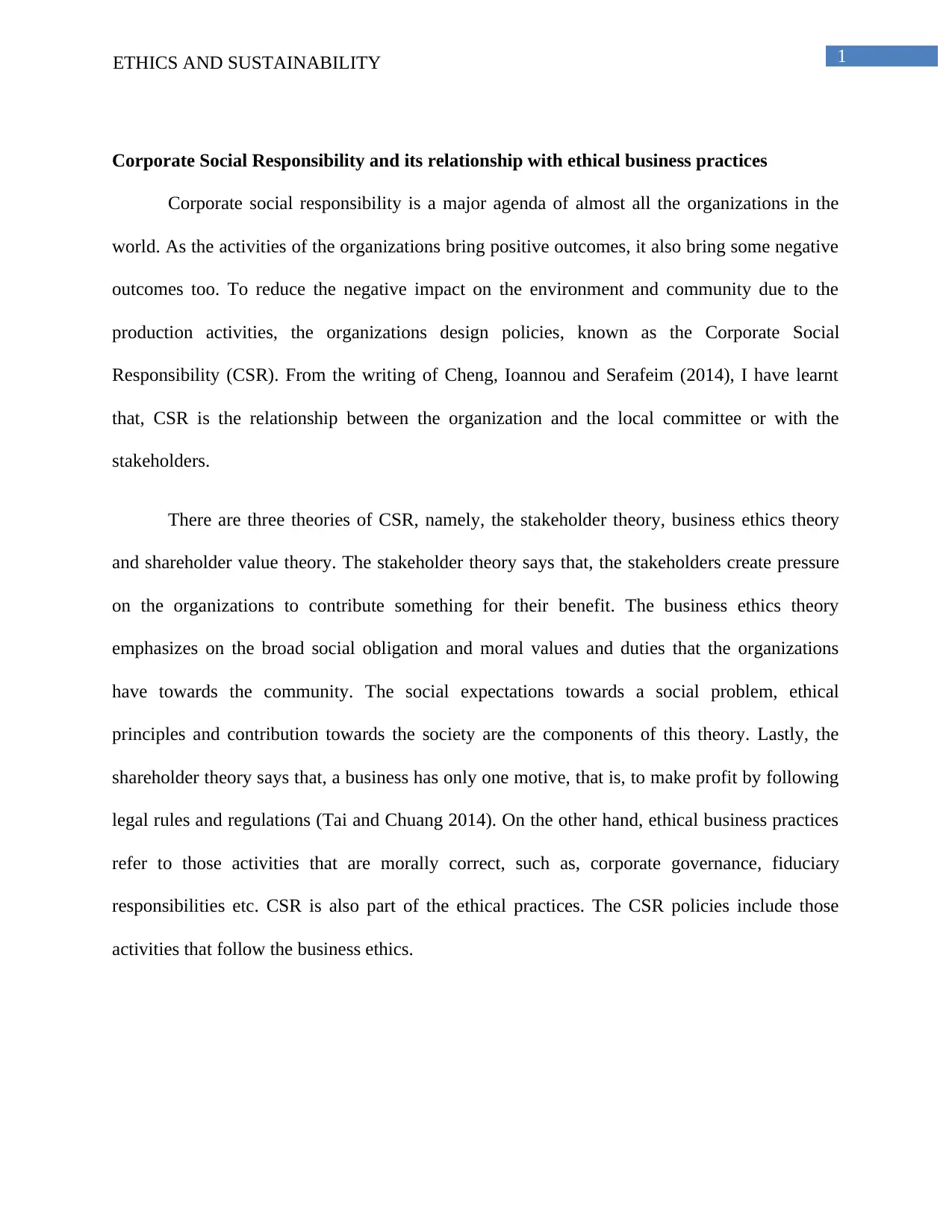
1ETHICS AND SUSTAINABILITY
Corporate Social Responsibility and its relationship with ethical business practices
Corporate social responsibility is a major agenda of almost all the organizations in the
world. As the activities of the organizations bring positive outcomes, it also bring some negative
outcomes too. To reduce the negative impact on the environment and community due to the
production activities, the organizations design policies, known as the Corporate Social
Responsibility (CSR). From the writing of Cheng, Ioannou and Serafeim (2014), I have learnt
that, CSR is the relationship between the organization and the local committee or with the
stakeholders.
There are three theories of CSR, namely, the stakeholder theory, business ethics theory
and shareholder value theory. The stakeholder theory says that, the stakeholders create pressure
on the organizations to contribute something for their benefit. The business ethics theory
emphasizes on the broad social obligation and moral values and duties that the organizations
have towards the community. The social expectations towards a social problem, ethical
principles and contribution towards the society are the components of this theory. Lastly, the
shareholder theory says that, a business has only one motive, that is, to make profit by following
legal rules and regulations (Tai and Chuang 2014). On the other hand, ethical business practices
refer to those activities that are morally correct, such as, corporate governance, fiduciary
responsibilities etc. CSR is also part of the ethical practices. The CSR policies include those
activities that follow the business ethics.
Corporate Social Responsibility and its relationship with ethical business practices
Corporate social responsibility is a major agenda of almost all the organizations in the
world. As the activities of the organizations bring positive outcomes, it also bring some negative
outcomes too. To reduce the negative impact on the environment and community due to the
production activities, the organizations design policies, known as the Corporate Social
Responsibility (CSR). From the writing of Cheng, Ioannou and Serafeim (2014), I have learnt
that, CSR is the relationship between the organization and the local committee or with the
stakeholders.
There are three theories of CSR, namely, the stakeholder theory, business ethics theory
and shareholder value theory. The stakeholder theory says that, the stakeholders create pressure
on the organizations to contribute something for their benefit. The business ethics theory
emphasizes on the broad social obligation and moral values and duties that the organizations
have towards the community. The social expectations towards a social problem, ethical
principles and contribution towards the society are the components of this theory. Lastly, the
shareholder theory says that, a business has only one motive, that is, to make profit by following
legal rules and regulations (Tai and Chuang 2014). On the other hand, ethical business practices
refer to those activities that are morally correct, such as, corporate governance, fiduciary
responsibilities etc. CSR is also part of the ethical practices. The CSR policies include those
activities that follow the business ethics.
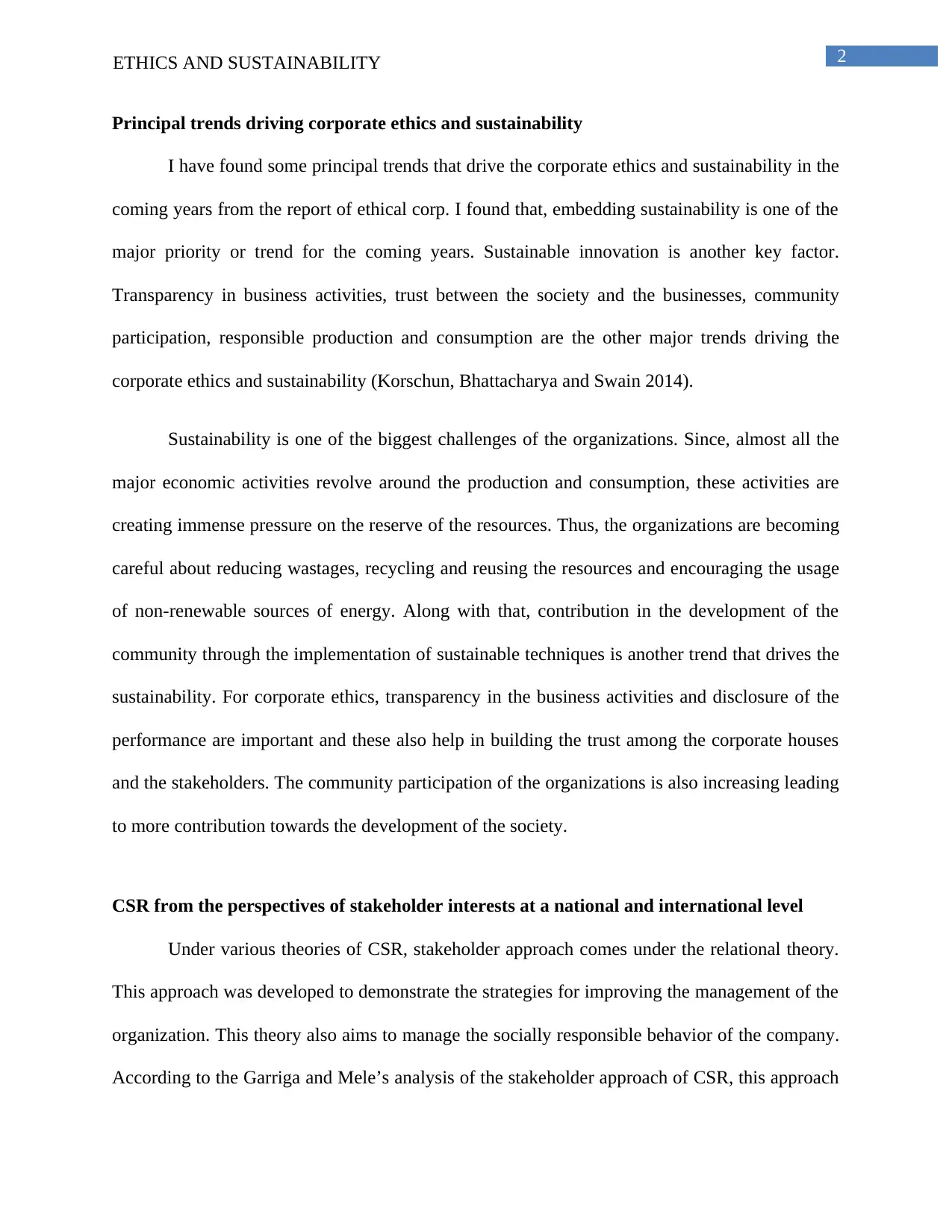
2ETHICS AND SUSTAINABILITY
Principal trends driving corporate ethics and sustainability
I have found some principal trends that drive the corporate ethics and sustainability in the
coming years from the report of ethical corp. I found that, embedding sustainability is one of the
major priority or trend for the coming years. Sustainable innovation is another key factor.
Transparency in business activities, trust between the society and the businesses, community
participation, responsible production and consumption are the other major trends driving the
corporate ethics and sustainability (Korschun, Bhattacharya and Swain 2014).
Sustainability is one of the biggest challenges of the organizations. Since, almost all the
major economic activities revolve around the production and consumption, these activities are
creating immense pressure on the reserve of the resources. Thus, the organizations are becoming
careful about reducing wastages, recycling and reusing the resources and encouraging the usage
of non-renewable sources of energy. Along with that, contribution in the development of the
community through the implementation of sustainable techniques is another trend that drives the
sustainability. For corporate ethics, transparency in the business activities and disclosure of the
performance are important and these also help in building the trust among the corporate houses
and the stakeholders. The community participation of the organizations is also increasing leading
to more contribution towards the development of the society.
CSR from the perspectives of stakeholder interests at a national and international level
Under various theories of CSR, stakeholder approach comes under the relational theory.
This approach was developed to demonstrate the strategies for improving the management of the
organization. This theory also aims to manage the socially responsible behavior of the company.
According to the Garriga and Mele’s analysis of the stakeholder approach of CSR, this approach
Principal trends driving corporate ethics and sustainability
I have found some principal trends that drive the corporate ethics and sustainability in the
coming years from the report of ethical corp. I found that, embedding sustainability is one of the
major priority or trend for the coming years. Sustainable innovation is another key factor.
Transparency in business activities, trust between the society and the businesses, community
participation, responsible production and consumption are the other major trends driving the
corporate ethics and sustainability (Korschun, Bhattacharya and Swain 2014).
Sustainability is one of the biggest challenges of the organizations. Since, almost all the
major economic activities revolve around the production and consumption, these activities are
creating immense pressure on the reserve of the resources. Thus, the organizations are becoming
careful about reducing wastages, recycling and reusing the resources and encouraging the usage
of non-renewable sources of energy. Along with that, contribution in the development of the
community through the implementation of sustainable techniques is another trend that drives the
sustainability. For corporate ethics, transparency in the business activities and disclosure of the
performance are important and these also help in building the trust among the corporate houses
and the stakeholders. The community participation of the organizations is also increasing leading
to more contribution towards the development of the society.
CSR from the perspectives of stakeholder interests at a national and international level
Under various theories of CSR, stakeholder approach comes under the relational theory.
This approach was developed to demonstrate the strategies for improving the management of the
organization. This theory also aims to manage the socially responsible behavior of the company.
According to the Garriga and Mele’s analysis of the stakeholder approach of CSR, this approach
⊘ This is a preview!⊘
Do you want full access?
Subscribe today to unlock all pages.

Trusted by 1+ million students worldwide
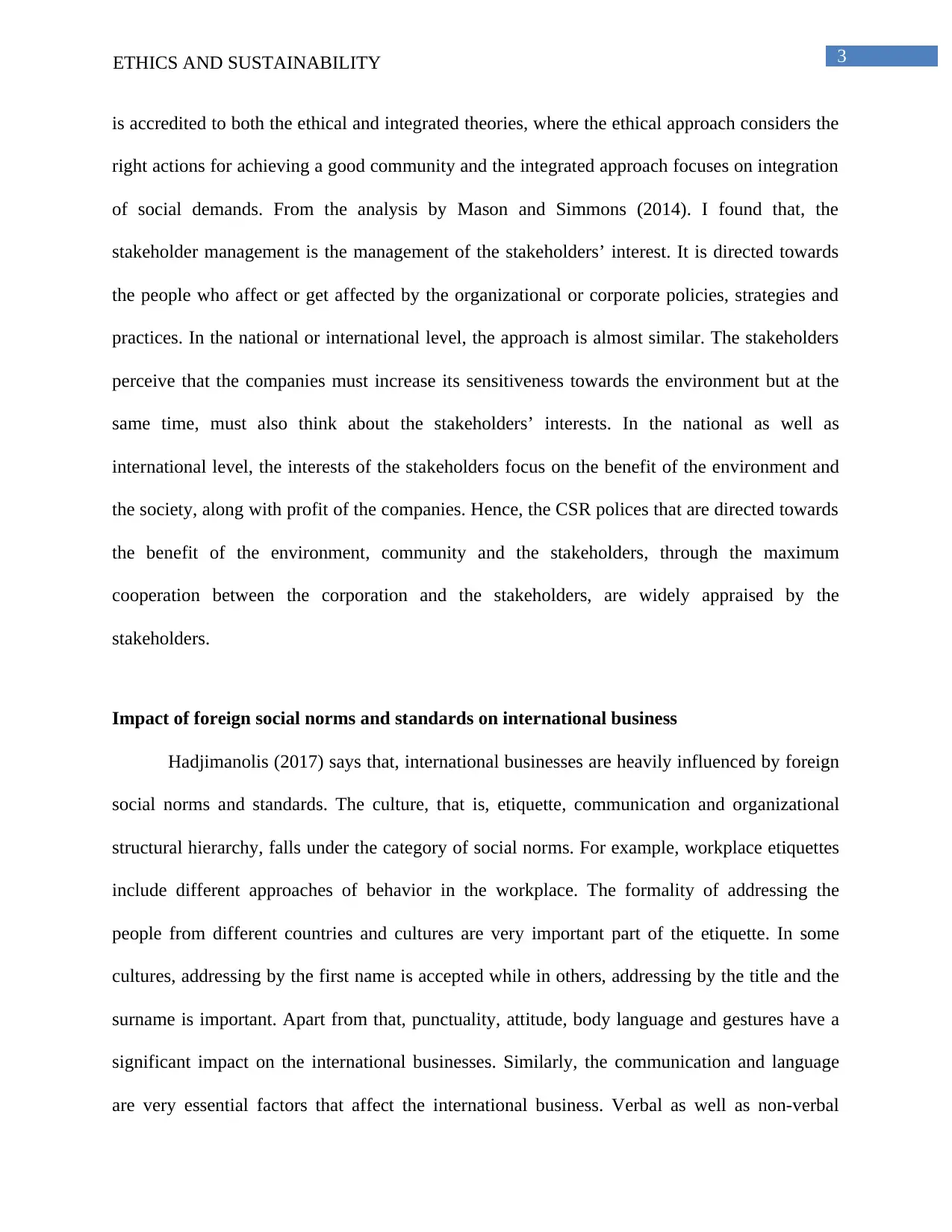
3ETHICS AND SUSTAINABILITY
is accredited to both the ethical and integrated theories, where the ethical approach considers the
right actions for achieving a good community and the integrated approach focuses on integration
of social demands. From the analysis by Mason and Simmons (2014). I found that, the
stakeholder management is the management of the stakeholders’ interest. It is directed towards
the people who affect or get affected by the organizational or corporate policies, strategies and
practices. In the national or international level, the approach is almost similar. The stakeholders
perceive that the companies must increase its sensitiveness towards the environment but at the
same time, must also think about the stakeholders’ interests. In the national as well as
international level, the interests of the stakeholders focus on the benefit of the environment and
the society, along with profit of the companies. Hence, the CSR polices that are directed towards
the benefit of the environment, community and the stakeholders, through the maximum
cooperation between the corporation and the stakeholders, are widely appraised by the
stakeholders.
Impact of foreign social norms and standards on international business
Hadjimanolis (2017) says that, international businesses are heavily influenced by foreign
social norms and standards. The culture, that is, etiquette, communication and organizational
structural hierarchy, falls under the category of social norms. For example, workplace etiquettes
include different approaches of behavior in the workplace. The formality of addressing the
people from different countries and cultures are very important part of the etiquette. In some
cultures, addressing by the first name is accepted while in others, addressing by the title and the
surname is important. Apart from that, punctuality, attitude, body language and gestures have a
significant impact on the international businesses. Similarly, the communication and language
are very essential factors that affect the international business. Verbal as well as non-verbal
is accredited to both the ethical and integrated theories, where the ethical approach considers the
right actions for achieving a good community and the integrated approach focuses on integration
of social demands. From the analysis by Mason and Simmons (2014). I found that, the
stakeholder management is the management of the stakeholders’ interest. It is directed towards
the people who affect or get affected by the organizational or corporate policies, strategies and
practices. In the national or international level, the approach is almost similar. The stakeholders
perceive that the companies must increase its sensitiveness towards the environment but at the
same time, must also think about the stakeholders’ interests. In the national as well as
international level, the interests of the stakeholders focus on the benefit of the environment and
the society, along with profit of the companies. Hence, the CSR polices that are directed towards
the benefit of the environment, community and the stakeholders, through the maximum
cooperation between the corporation and the stakeholders, are widely appraised by the
stakeholders.
Impact of foreign social norms and standards on international business
Hadjimanolis (2017) says that, international businesses are heavily influenced by foreign
social norms and standards. The culture, that is, etiquette, communication and organizational
structural hierarchy, falls under the category of social norms. For example, workplace etiquettes
include different approaches of behavior in the workplace. The formality of addressing the
people from different countries and cultures are very important part of the etiquette. In some
cultures, addressing by the first name is accepted while in others, addressing by the title and the
surname is important. Apart from that, punctuality, attitude, body language and gestures have a
significant impact on the international businesses. Similarly, the communication and language
are very essential factors that affect the international business. Verbal as well as non-verbal
Paraphrase This Document
Need a fresh take? Get an instant paraphrase of this document with our AI Paraphraser
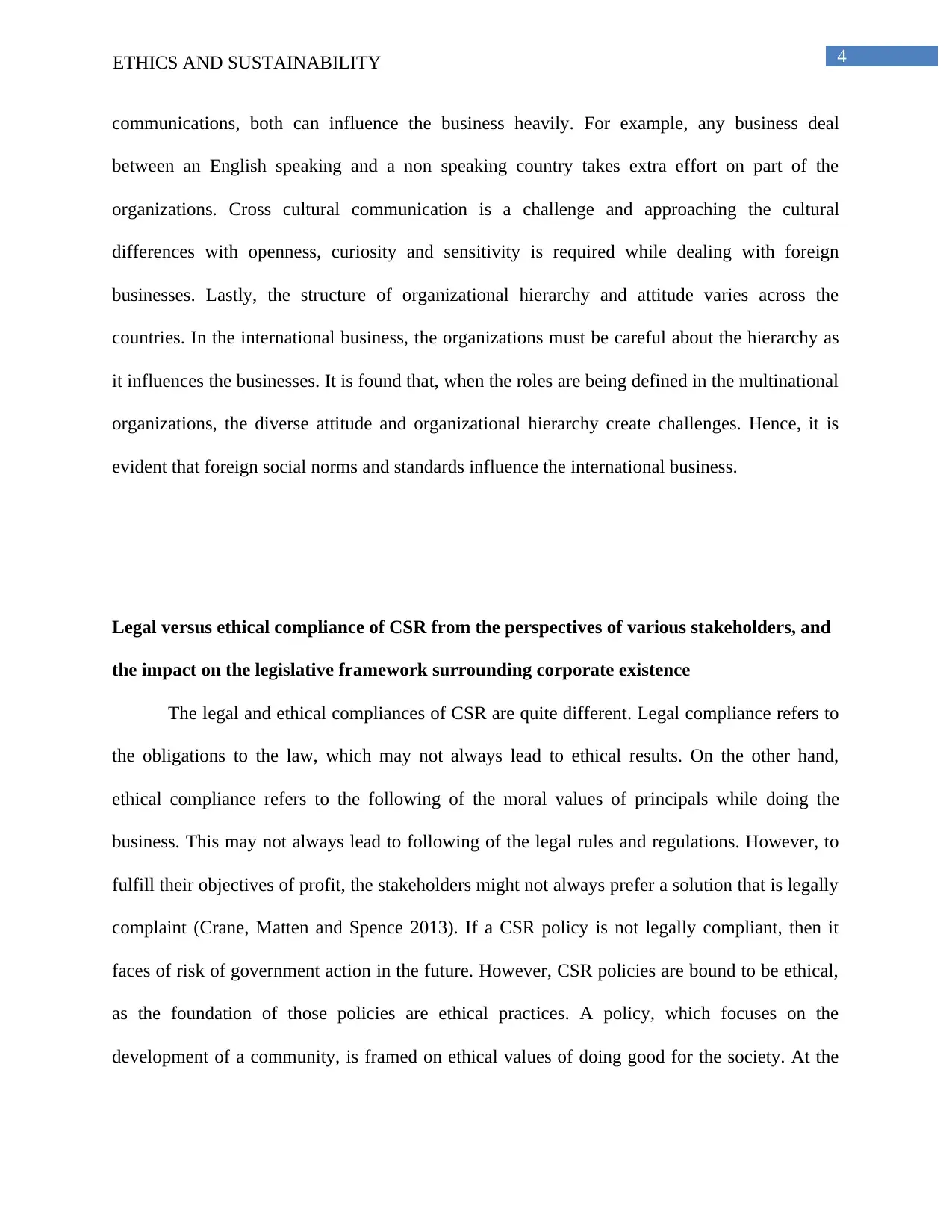
4ETHICS AND SUSTAINABILITY
communications, both can influence the business heavily. For example, any business deal
between an English speaking and a non speaking country takes extra effort on part of the
organizations. Cross cultural communication is a challenge and approaching the cultural
differences with openness, curiosity and sensitivity is required while dealing with foreign
businesses. Lastly, the structure of organizational hierarchy and attitude varies across the
countries. In the international business, the organizations must be careful about the hierarchy as
it influences the businesses. It is found that, when the roles are being defined in the multinational
organizations, the diverse attitude and organizational hierarchy create challenges. Hence, it is
evident that foreign social norms and standards influence the international business.
Legal versus ethical compliance of CSR from the perspectives of various stakeholders, and
the impact on the legislative framework surrounding corporate existence
The legal and ethical compliances of CSR are quite different. Legal compliance refers to
the obligations to the law, which may not always lead to ethical results. On the other hand,
ethical compliance refers to the following of the moral values of principals while doing the
business. This may not always lead to following of the legal rules and regulations. However, to
fulfill their objectives of profit, the stakeholders might not always prefer a solution that is legally
complaint (Crane, Matten and Spence 2013). If a CSR policy is not legally compliant, then it
faces of risk of government action in the future. However, CSR policies are bound to be ethical,
as the foundation of those policies are ethical practices. A policy, which focuses on the
development of a community, is framed on ethical values of doing good for the society. At the
communications, both can influence the business heavily. For example, any business deal
between an English speaking and a non speaking country takes extra effort on part of the
organizations. Cross cultural communication is a challenge and approaching the cultural
differences with openness, curiosity and sensitivity is required while dealing with foreign
businesses. Lastly, the structure of organizational hierarchy and attitude varies across the
countries. In the international business, the organizations must be careful about the hierarchy as
it influences the businesses. It is found that, when the roles are being defined in the multinational
organizations, the diverse attitude and organizational hierarchy create challenges. Hence, it is
evident that foreign social norms and standards influence the international business.
Legal versus ethical compliance of CSR from the perspectives of various stakeholders, and
the impact on the legislative framework surrounding corporate existence
The legal and ethical compliances of CSR are quite different. Legal compliance refers to
the obligations to the law, which may not always lead to ethical results. On the other hand,
ethical compliance refers to the following of the moral values of principals while doing the
business. This may not always lead to following of the legal rules and regulations. However, to
fulfill their objectives of profit, the stakeholders might not always prefer a solution that is legally
complaint (Crane, Matten and Spence 2013). If a CSR policy is not legally compliant, then it
faces of risk of government action in the future. However, CSR policies are bound to be ethical,
as the foundation of those policies are ethical practices. A policy, which focuses on the
development of a community, is framed on ethical values of doing good for the society. At the
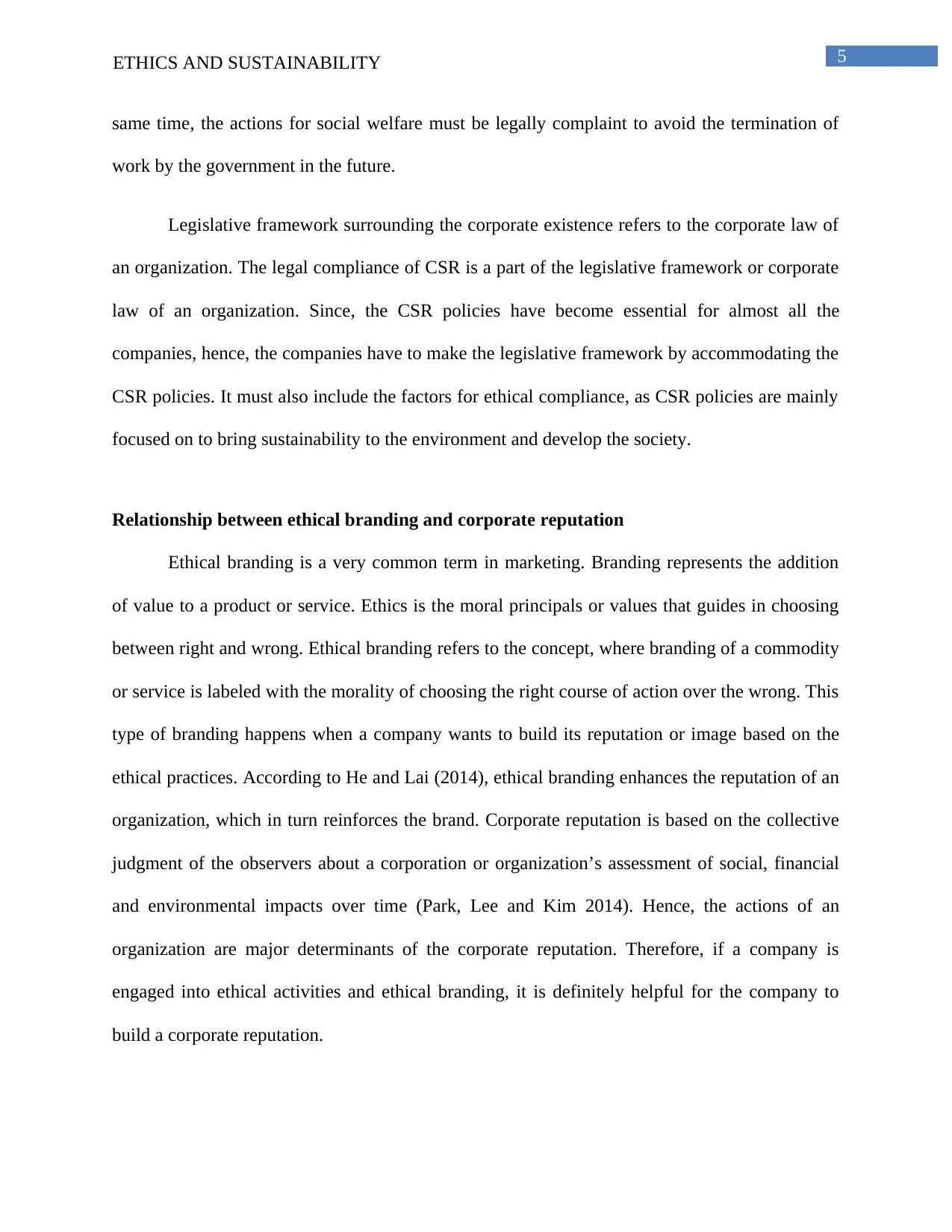
5ETHICS AND SUSTAINABILITY
same time, the actions for social welfare must be legally complaint to avoid the termination of
work by the government in the future.
Legislative framework surrounding the corporate existence refers to the corporate law of
an organization. The legal compliance of CSR is a part of the legislative framework or corporate
law of an organization. Since, the CSR policies have become essential for almost all the
companies, hence, the companies have to make the legislative framework by accommodating the
CSR policies. It must also include the factors for ethical compliance, as CSR policies are mainly
focused on to bring sustainability to the environment and develop the society.
Relationship between ethical branding and corporate reputation
Ethical branding is a very common term in marketing. Branding represents the addition
of value to a product or service. Ethics is the moral principals or values that guides in choosing
between right and wrong. Ethical branding refers to the concept, where branding of a commodity
or service is labeled with the morality of choosing the right course of action over the wrong. This
type of branding happens when a company wants to build its reputation or image based on the
ethical practices. According to He and Lai (2014), ethical branding enhances the reputation of an
organization, which in turn reinforces the brand. Corporate reputation is based on the collective
judgment of the observers about a corporation or organization’s assessment of social, financial
and environmental impacts over time (Park, Lee and Kim 2014). Hence, the actions of an
organization are major determinants of the corporate reputation. Therefore, if a company is
engaged into ethical activities and ethical branding, it is definitely helpful for the company to
build a corporate reputation.
same time, the actions for social welfare must be legally complaint to avoid the termination of
work by the government in the future.
Legislative framework surrounding the corporate existence refers to the corporate law of
an organization. The legal compliance of CSR is a part of the legislative framework or corporate
law of an organization. Since, the CSR policies have become essential for almost all the
companies, hence, the companies have to make the legislative framework by accommodating the
CSR policies. It must also include the factors for ethical compliance, as CSR policies are mainly
focused on to bring sustainability to the environment and develop the society.
Relationship between ethical branding and corporate reputation
Ethical branding is a very common term in marketing. Branding represents the addition
of value to a product or service. Ethics is the moral principals or values that guides in choosing
between right and wrong. Ethical branding refers to the concept, where branding of a commodity
or service is labeled with the morality of choosing the right course of action over the wrong. This
type of branding happens when a company wants to build its reputation or image based on the
ethical practices. According to He and Lai (2014), ethical branding enhances the reputation of an
organization, which in turn reinforces the brand. Corporate reputation is based on the collective
judgment of the observers about a corporation or organization’s assessment of social, financial
and environmental impacts over time (Park, Lee and Kim 2014). Hence, the actions of an
organization are major determinants of the corporate reputation. Therefore, if a company is
engaged into ethical activities and ethical branding, it is definitely helpful for the company to
build a corporate reputation.
⊘ This is a preview!⊘
Do you want full access?
Subscribe today to unlock all pages.

Trusted by 1+ million students worldwide
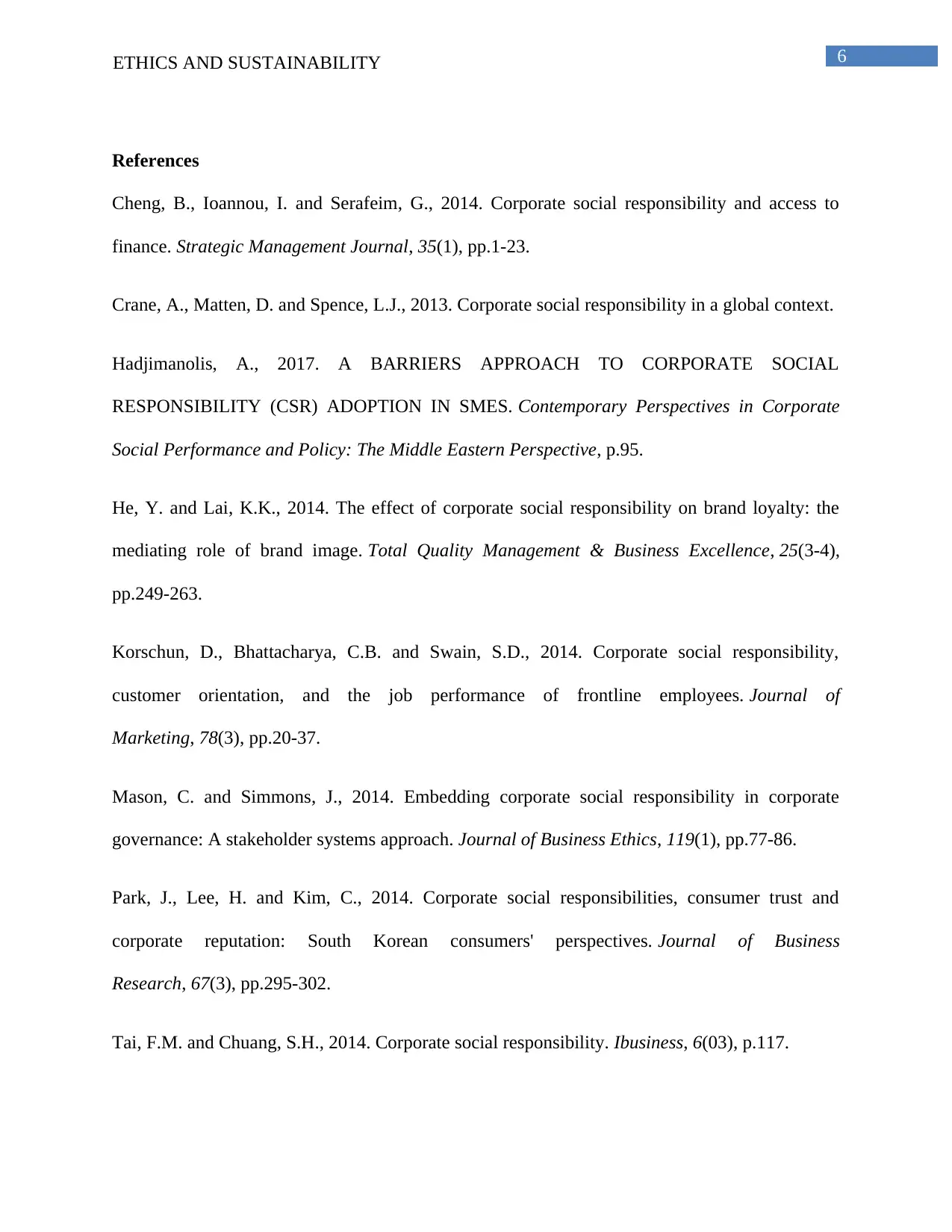
6ETHICS AND SUSTAINABILITY
References
Cheng, B., Ioannou, I. and Serafeim, G., 2014. Corporate social responsibility and access to
finance. Strategic Management Journal, 35(1), pp.1-23.
Crane, A., Matten, D. and Spence, L.J., 2013. Corporate social responsibility in a global context.
Hadjimanolis, A., 2017. A BARRIERS APPROACH TO CORPORATE SOCIAL
RESPONSIBILITY (CSR) ADOPTION IN SMES. Contemporary Perspectives in Corporate
Social Performance and Policy: The Middle Eastern Perspective, p.95.
He, Y. and Lai, K.K., 2014. The effect of corporate social responsibility on brand loyalty: the
mediating role of brand image. Total Quality Management & Business Excellence, 25(3-4),
pp.249-263.
Korschun, D., Bhattacharya, C.B. and Swain, S.D., 2014. Corporate social responsibility,
customer orientation, and the job performance of frontline employees. Journal of
Marketing, 78(3), pp.20-37.
Mason, C. and Simmons, J., 2014. Embedding corporate social responsibility in corporate
governance: A stakeholder systems approach. Journal of Business Ethics, 119(1), pp.77-86.
Park, J., Lee, H. and Kim, C., 2014. Corporate social responsibilities, consumer trust and
corporate reputation: South Korean consumers' perspectives. Journal of Business
Research, 67(3), pp.295-302.
Tai, F.M. and Chuang, S.H., 2014. Corporate social responsibility. Ibusiness, 6(03), p.117.
References
Cheng, B., Ioannou, I. and Serafeim, G., 2014. Corporate social responsibility and access to
finance. Strategic Management Journal, 35(1), pp.1-23.
Crane, A., Matten, D. and Spence, L.J., 2013. Corporate social responsibility in a global context.
Hadjimanolis, A., 2017. A BARRIERS APPROACH TO CORPORATE SOCIAL
RESPONSIBILITY (CSR) ADOPTION IN SMES. Contemporary Perspectives in Corporate
Social Performance and Policy: The Middle Eastern Perspective, p.95.
He, Y. and Lai, K.K., 2014. The effect of corporate social responsibility on brand loyalty: the
mediating role of brand image. Total Quality Management & Business Excellence, 25(3-4),
pp.249-263.
Korschun, D., Bhattacharya, C.B. and Swain, S.D., 2014. Corporate social responsibility,
customer orientation, and the job performance of frontline employees. Journal of
Marketing, 78(3), pp.20-37.
Mason, C. and Simmons, J., 2014. Embedding corporate social responsibility in corporate
governance: A stakeholder systems approach. Journal of Business Ethics, 119(1), pp.77-86.
Park, J., Lee, H. and Kim, C., 2014. Corporate social responsibilities, consumer trust and
corporate reputation: South Korean consumers' perspectives. Journal of Business
Research, 67(3), pp.295-302.
Tai, F.M. and Chuang, S.H., 2014. Corporate social responsibility. Ibusiness, 6(03), p.117.
1 out of 7
Related Documents
Your All-in-One AI-Powered Toolkit for Academic Success.
+13062052269
info@desklib.com
Available 24*7 on WhatsApp / Email
![[object Object]](/_next/static/media/star-bottom.7253800d.svg)
Unlock your academic potential
Copyright © 2020–2026 A2Z Services. All Rights Reserved. Developed and managed by ZUCOL.





